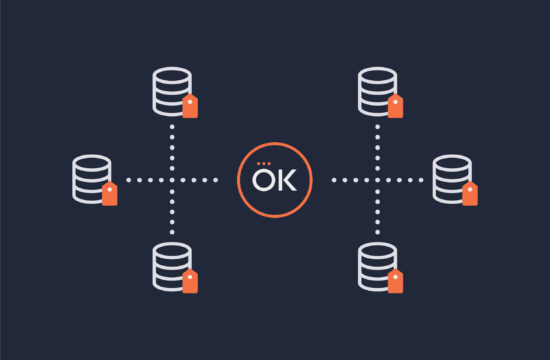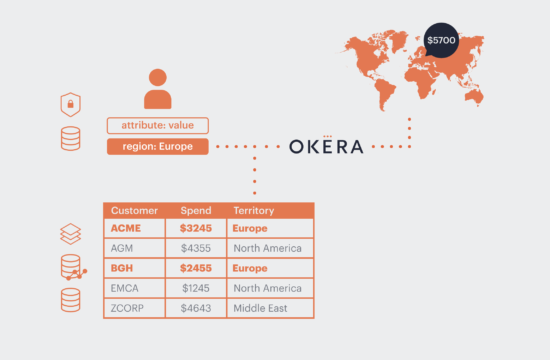Integration of market-leading solutions enables self-service analytics and data access governance across the data platform
The modern data platform has come a long way in terms of democratizing analytics, but it still fails to deliver on the complete enterprise data governance and protection strategy. That is because the platform must serve two rulers – IT and the business. Not only is there a critical technological need to bridge the gap between the two sides, but the need for alignment of people, process, and operations across the CIO and CDO domains causes most efforts to fail at the “last mile” where data transforms into business intelligence.
In the era of data privacy regulations such as the General Data Protection Regulation (GDPR) in the EU, the California Consumer Privacy Act (CCPA), and most recently the General Data Protection Law (LGPD) in Brazil, this is of critical importance. Having silos of information that can’t reach users in a timely and productive manner can be more costly than ever.
Today, I’m excited to announce Okera’s integration with Collibra, the Data Intelligence company that provides a unified business platform for digital business transformation. This effort is underpinned by a strong value proposition of enabling agile enterprise data governance and access via the Collibra Catalog, with Okera providing automation of security and privacy enforcement at scale to all data consumers..
As a former Collibrian who led their global partner channels for many years, I saw firsthand how Collibra helps enterprises create a solid foundation for leveraging data intelligence to impact their business. I was able to see this impact up close and alongside some of the greatest data consulting and integration partners across the globe.
I then leaped at the chance to join Okera – not only because I could unleash value through my personal network of worldwide partner relationships, but because the Okera value proposition was so crystal clear to me after my personal experience in the data governance market. Now, with the Okera executive team, I’m bringing the leading technology and integration partners together to provide best-of-breed solutioning around Okera and our alliance community, ensuring that our customers can benefit from the collective leverage of our experience.
Many enterprise data governance initiatives stall out or die over time due to the complexity of the behavior change required in people and process. Okera creates immediate value by boosting the value and pull of the Collibra Catalog data assets, and ensures that critical business governance policies are extended to be able to protect physical data access.
By solving for that “last mile” of data governance and access control, automatically enforced across the entire analytics stack, we’re able to significantly accelerate time-to-insight for our customers’ digital transformation initiatives and increase their competitive advantage.
We’re really excited to be bringing the Okera and Collibra integration to market in partnership with many leading data consultancies such as First San Francisco Partners, who provide integrated data governance capabilities to create and operationalize data strategies to make information actionable.
“We immediately saw the compelling value created by linking Collibra’s robust data governance and policy management capabilities with the Okera solution to automate data access policies within the Catalog,” said Gregg Loos, Chief Revenue Officer of First San Francisco Partners (FSFP). “Together with FSFP’s sensitive data assessment, we look forward to helping organizations unlock the full value of their data with secure, automated, scalable and trustworthy enterprise-wide governance.”
The Problem: Governance and IT at Odds
Many data-driven enterprises have made significant investments in a data catalog as the foundational tool of their data governance strategy. The enterprise data catalog empowers business users to quickly discover and understand data so they can generate impactful insights that drive business value. Collibra, a four-time Leader in Gartner’s Magic Quadrant for Metadata Management Solutions, is the market leader for defining and innovating in this category.
While business users are a huge beneficiary of a well-maintained data catalog, the governance team are the ones who own it and keep it up to date. They’re responsible for understanding the context of the organization’s data and any regulations that may apply to it. They define the organization’s governance policies and security classification standards – which users are allowed to see sensitive data and for what purpose, and when sensitive values need to either be redacted or transformed (masking, tokenization, etc) for de-identification. The enterprise data catalog allows them to easily document, curate and classify data so that access policies can be defined at a very fine-grained level.
Governance teams invest a large amount of time, money, and energy into their catalogs – building out workflows and processes for change management in an attempt to reduce the organization’s compliance risk. However, they are currently not empowered to ensure consistent enforcement of their policies, as they lack insight into the technical metadata required to scale policies across a diverse and complex enterprise analytics platform. Nor do they have easy access to the kind of unified audit log that would give them visibility into how policies are actually being enforced.
Enforcing data access policies currently falls to IT or the data platform team, who are the only ones capable of interacting with the source systems, databases or analytics engines. Since these systems often don’t support fine-grained access policies, the platform team must now design bespoke enforcement solutions for each tool, or create multiple copies of the data for each use case. Wherever there is doubt, the data will be locked down as restrictively as possible. This often results in inconsistent policy enforcement, leaving the organization exposed to potential regulatory risk, and slows business agility at the edges where data must be consumed and quickly analyzed for competitive advantage.
Ultimately, this disconnect between the governance and the platform teams results in an operational bottleneck that slows down the work of the data analysts and data scientists who need access to the data. Even with all the value that an enterprise data catalog provides, the organization is still stuck at the “last mile” trying to enable secure data access.
Click here to learn more about how the Okera and Collibra integrated solution improves compliance, saves time by eliminating repetitive work, and increases business efficiency.
Closing Thoughts
With this new integration, Okera can leverage all of the hard work our customers have put into curating and classifying their data within Collibra to automatically enforce fine-grained data access control policies. It’s a powerful relationship, and one that is already proving out results for our joint customers.
I guarantee you that Okera has the exceptional technology, leadership and experience to achieve what we set out to do. It won’t be easy, and we won’t do it alone – we will get there by continuing to join hands with the best-in-class technology solutions and consulting partners. If you have the desire, focus, and commitment to our cause and wish to join the Okera Alliances community, email us at partners@okera.com. We look forward to hearing from you.
And to learn more about how we’re bringing the Okera and Collibra integration to market and significantly accelerating time-to-insight on our customers’ digital transformation initiatives, download our on-demand webinar “Best Practices to Accelerate Enterprise Data Governance with Data Access and Protection” with Kelle O’Neal of First San Francisco Partners.



